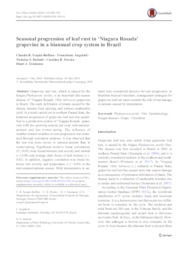Seasonal progression of leaf rust in Niagara Rosada grapevine in a biannual crop system in Brazil.
Seasonal progression of leaf rust in Niagara Rosada grapevine in a biannual crop system in Brazil.
Author(s): SCAPIN-BUFFARA, C. R.; ANGELOTTI, F.; DUFAULT, N. S.; PEREIRA, C. B.; TESSMANN, D. J.
Summary: Grapevine leaf rust, which is caused by the fungus Phakopsora euvitis, is an important late-season disease of ?Niagara Rosada? (Vitis labrusca) grapevine in Brazil. The early defoliation of plants caused by the disease impairs fruit ripening and reduces marketable yield. In a study carried out in northern Paraná State, the temporal progression of grapevine leaf rust was quantified in a production system of ?Niagara Rosada? grapevine with two growing seasons per year: mid-summerautumn and late winter-spring. The influence of weather-related variables on rust progression was examined through correlation analyses. It was observed that the rust was more severe in summer-autumn than in winter-spring. Significant positive linear correlations (P ≤ 0.05) were found between rust severity and rainfall (r ≥ 0.90) and average daily hours of leaf wetness (r ≥ 0.82). In addition, negative correlation was found between rust severity and temperature (r≥ −0.84) in the mid-summer/autumn season. Mild temperatures in autumn were considered decisive for rust progression. In Brazilian tropical viticulture, management strategies for grapevine leaf rust must consider the risk of rust damage in autumn caused by temperature.
Publication year: 2018
Types of publication: Journal article
Unit: Embrapa Semi-arid Region
Observation
Some of Embrapa's publications are published as ePub files. To read them, use or download one of the following free software options to your computer or mobile device. Android: Google Play Books; IOS: iBooks; Windows and Linux: Calibre.
Access other publications
Access the Agricultural Research Database (BDPA) to consult Embrapa's full library collection and records.
Visit Embrapa Bookstore to purchase books and other publications sold by Embrapa.

